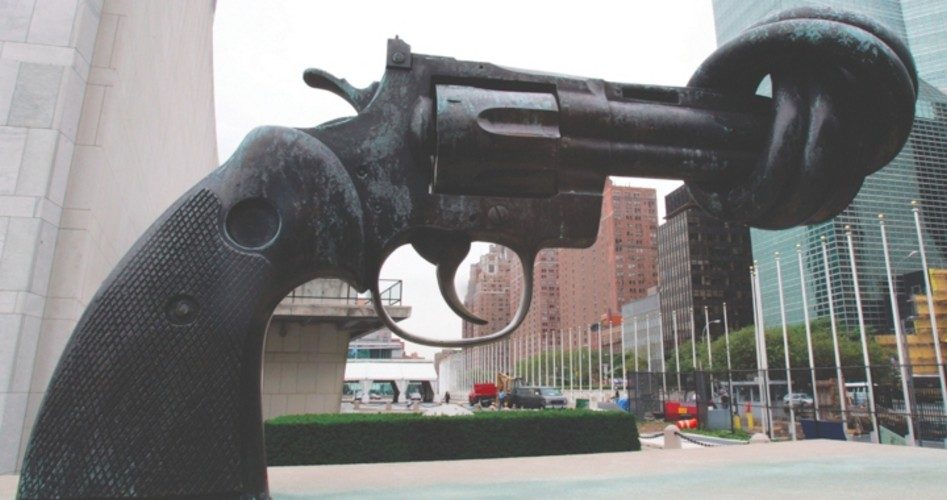
The United Nations is very troubled that the United States has retained its Second Amendment to the U.S. Constitution, which guarantees that “the right of the people to keep and bear arms, shall not be infringed.” Radical new UN proposals treat free people with the means to effect their own self-defense as a vital threat to the United Nations and its quest for what it calls the “peace-building process.”
More troubling still is the fact that for the first time this radical UN agenda represents a clear and present danger to our right to keep and bear arms. This is in part because the Clinton State Department is collaborating with the UN and its proposals. But another, perhaps more dangerous, prong of the UN attack on the right to keep and bear arms comes from an insidious quasi-private institution heavily funded by socialist Northern European governments. This little-known, UN-backed organization charges itself with developing “message strategies” and “campaigning and advocacy strategies” to obtain a UN-managed global ban on the private ownership of firearms.
Anti-Gun Agenda
The United Nations “Report of the Group of Governmental Experts on Small Arms” issued on August 19th bitterly complains that “there are wide differences among States [nations] as regards which types of arms are permitted for civilian possession, and as regards the circumstances under which they can legitimately be owned, carried and used. Such wide variation in national laws raise difficulties for effective regional or international coordination.” That the UN “experts” are complaining mainly about the United States is made clear from the concluding recommendations in the report. Among the “coordination” proposals adopted by the panel — enthusiastically seconded by UN Secretary-General Kofi Annan in his foreword to the report — are the following:
• “All States should ensure that they have in place adequate laws, regulations and administrative procedures to exercise effective control over the legal possession of small arms and light weapons and over their transfer….”
• “States are encouraged to integrate measures to control ammunition….”
• “States should work toward … the prohibition of unrestricted trade and private ownership of small arms and light weapons….”
The UN report defines small arms to include just about every category of firearms that exists: “The category of small arms includes revolvers and self-loading pistols, rifles and carbines, sub-machine guns, assault rifles and light machine guns.” The United Nations call for banning even hunting rifles and antique revolvers from civilian possession demonstrates the radical and groundbreaking nature of the report.
Though the current United Nations attack on the Second Amendment fails to take aim at civilian possession of shotguns, shotgun owners should find no security in the current UN focus. The UN report in no way limits global firearms restrictions to “military”-related firearms such as “revolvers” and “rifles.” The UN “experts” explain that the United Nations must deal with firearms on social as well as military criteria: “Virtually every part of the United Nations system is dealing in one way or another with the consequences of the armed conflicts, insecurity, violence, crime, social disruption, displaced peoples and human suffering that are directly or indirectly associated with the wide availability and the use of these weapons.”
To implement their gun control measures, UN officials plan to ignore the reservation of national sovereignty guaranteed in the UN Charter the same way that the U.S. Congress often ignores the 10th Amendment to the U.S. Constitution. The UN Charter bans UN intervention in “matters which are essentially within the domestic jurisdiction of any state,” but the UN is no longer concerned with legal niceties. Annan explained in his September 22nd address before the UN General Assembly that “state sovereignty, in its most basic sense, is being redefined…. A new, broader definition of national interest is needed in the new century [where] the collective interest is the national interest.” In Annan’s view, the “collective interest” mandates that Americans and other peoples of the world should not own firearms and that the UN should be the key organ charged with collecting them. Annan emphasized in a September 24th speech that “controlling the easy availability of small arms is a prerequisite for a successful peace-building process,” which is why the “United Nations has played a leading role in putting the issue of small arms firmly on the international agenda.”
UN control over a global movement to ban private firearms ownership has already begun. According to a September 23rd UN press release, the United Nations convened a two-day workshop to set up a test arms register and “database” maintained by the UN for the entire continent of Africa. There have already been calls to make this regional database binding on all nations.
Clinton Administration Assent
More troubling than the fact that a corrupt United Nations is seeking to attack the U.S. Bill of Rights and confiscate firearms legally owned by American citizens is the fact that the Clinton administration has been actively conspiring with the United Nations to accomplish this subversive goal. UN Secretary-General Kofi Annan emphasizes in his foreword to the “Report of the Group of Governmental Experts on Small Arms” that it was “prepared, and adopted by consensus” and was the product of “unanimity” among the “expert” members of the group. Based upon Annan’s statement, we can presume that none of the “experts” object to such a naked attack on the right to bear arms. Yet among the “experts” who drafted the report was U.S. State Department Senior Foreign Affairs Specialist Herbert L. Calhoun.
State Department assistance to the UN global gun grab agenda dates back to at least 1994, when the Washington Times reported in its May 24th edition that “the Clinton administration has agreed to participate in a discussion of ways for the United Nations to control the manufacture of guns and their sales to civilians…. The UN working paper declares that governments individually are ‘impotent’ to deal with global arms trafficking and proposes ‘harmonization’ of gun control standards around the world to make trafficking easier to spot and prevent.” The Times report noted that “any ‘harmonization’ would inevitably mean tightening controls on the loosely regulated U.S. gun business.”
State Department officials have expressed general sympathies with the current UN proposals without mentioning the specific attack on citizen firearms ownership. Secretary of State Madeleine Albright told the first-ever UN Security Council Small Arms Ministerial on September 24th that “the United States strongly supports these steps,” that we “welcome the important precedent which the UN has set,” and that the U.S. would work to “commit to finishing negotiations on a firearms protocol to the UN Transnational Organized Crime Convention by the end of 2000.”
“The United Nations’ call for gun control is an affront to our way of life and our constitutional government,” Representative Ron Paul (R-TX) told The New American. “Mixing gun control with internationalism is certain to result in an assault on American rights and liberties.” Representative Roscoe Bartlett (R-MD) pointed out to The New American that the UN’s escalating gun confiscation campaign “fits the pattern of a UN that’s become a refuge and a foundation for promoting socialism and undermining national sovereignty and individual freedom.” The eager involvement of the Clinton/Albright State Department in that campaign illustrates anew the administration’s contempt for the Constitution, the rule of law, and our national independence.
NGO Advocacy
Conspiring officials within the Clinton administration do not constitute the only prong of the UN assault on the right to keep and bear arms. The UN has established within its Department for Disarmament Affairs a department of Coordinating Action on Small Arms (CASA). According to an August 14th UN press release, CASA would be charged with coordinating all UN small arms control efforts, including a responsibility “to encourage civil society involvement in building societal resistance to violence.” The reference to “civil society” suggests that the UN is trying to mobilize private sector Non-Governmental Organizations (NGOs) and citizen pressure on behalf of its agenda.
The attempt to generate pressure from below as well as from above has already obtained results. In November 1998 the UNESCO Courier suggested that “the political tides may be changing. An international campaign is now underway with non-governmental organizations of all stripes and colours — disarmament and gun control groups along with development and human rights associations in the North and South — building common ground with the active support of governments like Mali, Canada, Norway and Japan.”
This year the international campaign sought by the UNESCO Courier acquired an organizational face, although there is very little “non-governmental” about it. Annan specifically cited this new organization, as well as the UN-generated “momentum” justifying this impending power grab, in his September 24th address on small arms: “The momentum for combating small arms proliferation has also come from civil society, which has been increasingly active on this issue. The establishment early this year of the International Action Network on Small Arms [IANSA] has helped to sharpen public focus on small arms, which has helped us gain the public support necessary for success.” IANSA is intended to “provide a transnational framework” for the mobilization of a broad citizen movement in favor of gun control, according to the organizational goals posted on its website. The services IANSA intends to provide the UN-led global gun control movement include “campaigning and advocacy strategies,” “developing culturally appropriate ‘message’ strategies,” “information sharing” among NGOs, and “constituency building.”
Funding for this incipient propaganda campaign comes from the public trough of the taxpayers of the European socialist nations. IANSA notes on its website that its eight most significant financial donors include five government agencies: The Belgian Ministry for Development Cooperation; the Swedish Ministry of Foreign Affairs; the Netherlands Ministry of Foreign Affairs; the United Kingdom Department for International Development; and the Finnish Ministry of Foreign Affairs. (The remaining three are small, pacifist, U.S.-based tax-exempt foundations.)
Clinton’s “Buy-back” Initiative
On September 9th, Bill Clinton unveiled a proposal that represents yet another prong of the UN-directed global gun grab: A $15 million federal gun “buy-back” initiative to be implemented by the Department of Housing and Urban Development (HUD). Through subsidies from HUD, local police departments will be awarded up to $500,000 to collect and destroy an estimated 300,000 firearms. The UN Centre for Disarmament Affairs (UNCDA) refers to such “buy-backs” as a “practical method of micro-disarmament,” which has been field-tested by municipal governments in the U.S. — and by UN “peacekeeping” forces in Haiti, El Salvador, Nicaragua, and other countries. A 1995 UNCDA paper by Dr. Edward J. Laurance, a consultant to the UN Register of Conventional Arms since 1992, notes that the UNCDA has studied both “buy-back programs as practiced in many American cities” and those “conducted by the U.S. Army in Haiti” — the latter being part of a “peacekeeping” mission carried out on orders from the UN Security Council.
According to Dr. Laurance, government “buy-backs” of small arms “must be conducted in parallel with other efforts,” such as “seizure programs.” He also points out that “buy-backs” have a propaganda benefit, in that they focus “attention on the link between weapons availability and crime” — thereby preparing the public for more aggressive civilian disarmament measures. To illustrate a UN-supervised civilian “micro-disarmament” program that worked, he refers to El Salvador’s “new laws outlawing possession of military weapons and requiring all citizens to register hand guns and personal weapons. A new police force was created [and] trained under UN supervision … [which] received specialized training in searching for, confiscating and destroying … military-style weapons….”
Sami Faltas of the Bonn International Centre for Conversion, an international “think tank” that has advised UN officials on civilian disarmament programs around the world (and for which Dr. Laurance serves as a consultant), has laid out the program with stunning candor:
A subtle mix of rewards and penalties is needed for a weapons [confiscation] program to succeed. Ultimately, the ownership of arms should not be left to the personal choice of individuals. The state needs to preserve its monopoly of the legitimate use of force. So sanctions against the illegal possession and use of arms are necessary and should be imposed. However, during a weapons collection program, an amnesty is needed, and the emphasis should be on voluntary compliance and positive incentives.
The equation is quite easy to understand: Gun “buy-backs” prepare the public for uniform gun registration, which leads to universal gun confiscation and a state monopoly on lethal force. This was the process that led to mass murder of subject populations in Soviet Russia, National Socialist Germany, Communist China, and other despotisms. With the covert aid of the Clinton administration, the UN is now implementing this process on a global basis.
Photo: Statue of twisted revolver at UN headquarters
Related article:


